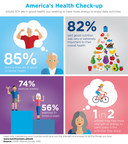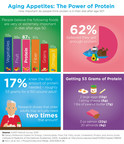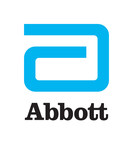America's Health Check-up: AARP and Abbott Survey Finds Half of Adults 50-Plus Wish They Had More Strength and Energy to Enjoy Daily Activities
- Building muscle through strength training and increased protein intake could help adults age better and live healthier lives
ABBOTT PARK, Ill. and WASHINGTON, May 4, 2016 /PRNewswire/ -- While Americans are redefining what it means to age well and stay healthy, many adults 50 and over are still feeling the effects of aging. AARP and Abbott surveyed 1,480 Americans aged 50 years and older and found that while a majority see themselves in good health, one in two reported that they wished they had more strength or energy to participate in the activities they enjoy.1
The AARP-Abbott survey found that a majority of adults are living healthier lives:
- 85 percent of those surveyed said they were in good or better health.
- 82 percent of people said good nutrition was either very or extremely important to their overall health.
- 74 percent said they exercise weekly and more than half (56 percent) did so more than three times a week.
- 57 percent said cardio was their preferred exercise, but other more resistance exercises that also help build muscles– weights (24 percent) and yoga or stretching (14 percent) – were not as common.
When it came to a person's muscle health, nearly three-fourths (73 percent) of people surveyed knew that adults naturally lose muscle with age, and 28 percent said they had already noticed some loss. And despite the fact that two-thirds said they had concerns about the impact of muscle loss, many respondents were not very concerned about the loss at this time.
The benefits of making changes now to keep muscles healthy goes beyond just having strength; muscles play a key role in a person's movement, including balance, posture and the body's metabolism.6 Muscle loss can also contribute to a lack of energy, making normal activities, like carrying heavy groceries or playing a game of golf, more difficult.
"Many of us expect to slow down as we get older, but the science shows there's a lot we can do to prevent or delay some of the more debilitating effects of aging," said Gabrielle Redford, Executive Editor, Health, for AARP. "Exercising and eating right are critical to staying healthy, starting in our 40s when we start to lose muscle mass, right through our 50s, 60s and beyond."
Changing the Muscle Mindset: Reversing Loss for Better Health
The survey findings match the science that shows people naturally start to lose up to 8 percent of muscle each decade starting at 40 years old, which accelerates to 15 percent at age 70 and can worsen with an illness or health setback.2-5
When asked in the survey, nearly all (95 percent) reported that they had a serious or chronic health condition after turning age 50, and many listed the health of their muscles as a concern when managing a health condition:
- Over a third (35 percent) reported being hospitalized due to serious or chronic health conditions, and among those, loss of strength (40 percent) and muscle loss (21 percent) were among their top concerns during and/or after.
- More than 60 percent said their top concerns of losing muscles are having decreased mobility, loss of strength and loss of independence; while more than half surveyed listed being less active and the ability to fight infections as their top concerns.
And these concerns aren't far from reality. In fact, you can lose lean body mass – made up mostly by muscles – up to three times faster when you are sick or injured, making it harder to recover and get back to daily activities.7 The good news: rebuilding muscle is possible.
Fueling the Body to Build Back Up
While age- and illness-related muscle loss is inevitable, exercise and nutrition can help rebuild strength – and protein is a critical part of the recipe. In the survey, 62 percent of adults believed they get enough protein and 70 percent have increased their intake of high-protein foods to minimize the risk of muscle loss. Yet, a majority of people did not know how much protein they actually need – when asked, only 17 percent said they knew that amount.
How much protein do adults really need? The recommended daily amount is roughly 53 grams for a 150 pound adult.8 However, research shows that older adults may actually need about two times this amount of protein.9 That's because people start absorbing and storing nutrients like protein differently as they age.
"Fueling the body with the right nutrition – particularly proteins and other muscle-building nutrients – is important for overall health, and enables you to experience all that life has to offer, whether that's playing with your grandchildren or your first 5K race," said Tiffany DeWitt, RD, a registered dietitian at Abbott. "By keeping well-nourished with age, you'll have more strength and energy to take on any challenge from achieving everyday goals to recovering from a health setback."
All adults over 50 should have regular muscle health and nutrition conversations with their doctors to help them create a plan with regular exercise and good nutrition to live a healthier, fuller life.
About the Survey
Abbott, the makers of Ensure, and AARP partnered to conduct an independent survey to understand how AARP members viewed diet and health issues as they age, including their muscle health. The survey was fielded to members of a voluntary panel comprised of U.S. AARP members aged 50 and older between December 10 and December 31, 2015. A total of 1,480 respondents participated in the research.
About AARP:
AARP is a nonprofit, nonpartisan organization, with a membership of nearly 38 million that helps people turn their goals and dreams into 'Real Possibilities' by changing the way America defines aging. With staffed offices in all 50 states, the District of Columbia, Puerto Rico, and the U.S. Virgin Islands, AARP works to strengthen communities and promote the issues that matter most to families such as healthcare security, financial security and personal fulfillment. AARP also advocates for individuals in the marketplace by selecting products and services of high quality and value to carry the AARP name. As a trusted source for news and information, AARP produces the world's largest circulation magazine, AARP The Magazine and AARP Bulletin. AARP does not endorse candidates for public office or make contributions to political campaigns or candidates. To learn more, visit www.aarp.org or follow @aarp and our CEO @JoAnn_Jenkins on Twitter.
About Abbott:
At Abbott (NYSE: ABT), we're committed to helping you live your best possible life through the power of health. For more than 125 years, we've brought new products and technologies to the world -- in nutrition, diagnostics, medical devices and branded generic pharmaceuticals -- that create more possibilities for more people at all stages of life. Today, 74,000 of us are working to help people live not just longer, but better, in the more than 150 countries we serve.
Connect with us at www.abbott.com, on Facebook at www.facebook.com/Abbott and on Twitter @AbbottNews and @AbbottGlobal.
|
References
|
|
1.
|
AARP and Abbott Consumer Panel Report, January 2016.
|
|
2.
|
Grimby GB, et al. Acta Physiol Scand. 1982;115:125.
|
|
3.
|
Larsson L, et al. J Appl Physiol. 1979;46:451.
|
|
4.
|
Flakoll P, et al. Nutrition. 2004;20:445-451.
|
|
5.
|
Baier S, et al. J Parenter Enteral Nutr. 2009;33:71-82.
|
|
6.
|
RR Wolfe. Am J Clin Nutr. 2006; 84(3): 475-482.
|
|
7.
|
Paddon-Jones D. Lean body mass loss with age. Columbus, OH: Abbott Nutrition; 2009.
|
|
8.
|
Dietary Reference Intakes for Energy, Carbohydrate. Fiber, Fat, Fatty Acids, Cholesterol, Protein, and Amino Acids. Institute of Medicine of the National Academies, 2005. Available at: http://www.nap.edu/read/10490/chapter/12#645.
|
|
9.
|
Kim I, et al. Am J Physiol Endocrinol Metab. 2014;308:21-28.
|
Photo - http://photos.prnewswire.com/prnh/20160503/363214-INFO
Photo - http://photos.prnewswire.com/prnh/20160503/363215-INFO
Photo - http://photos.prnewswire.com/prnh/20150928/271488LOGO
SOURCE Abbott
For further information: AARP Media Contact: Paola Torres, (202) 434-2555, or Abbott Media Contact: Aly Morici, (224) 668-0771
 BACK TO PRESS RELEASES
BACK TO PRESS RELEASES




